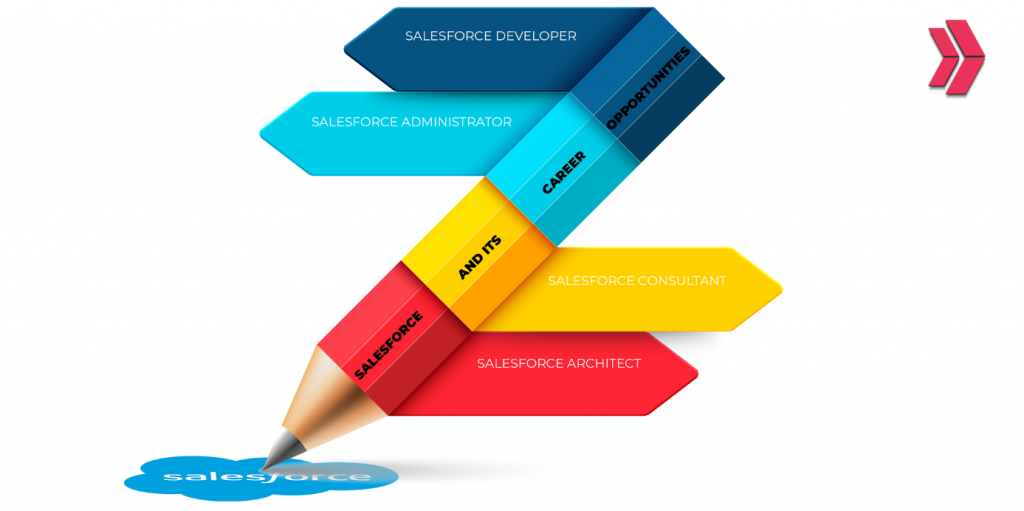Salesforce has undoubtedly become a leading customer relationship management (CRM) platform in today’s digital age. In today’s competitive job market, The question of “How to get a job in Salesforce without experience” can seem daunting. But don’t let this deter you. Despite having no prior experience and the increasing demand for Salesforce professionals, there are still ample ways to enter this booming sector. With the right strategy, dedication, and a keen interest in learning, it’s possible to break into this industry. This article will guide you through the necessary steps such as salesforce training and salesforce certifications to boost your chances of securing that coveted Salesforce role without experience.

Can I get a job in Salesforce without any prior experience?
Absolutely! With the right approach, including self-learning, networking, and volunteering, you can secure a Salesforce job without prior experience.
This also involves learning Salesforce, earning certifications, creating personal projects, and effectively showcasing your skills and knowledge.
What are the essential skills required for a Salesforce job?
Key skills include understanding the Salesforce platform, problem-solving abilities, good communication skills, project management, and knowledge of business processes and customer relationship management.
How long does it take to become proficient in Salesforce?
The time to become proficient in Salesforce varies based on the individual’s dedication, prior knowledge, and resources used for learning. However, with consistent study, one can gain a solid foundation in 3-6 months, and it can take several months to a year to become proficient in Salesforce.
Are Salesforce certifications necessary to land a job?
Salesforce certifications validate your knowledge and demonstrate your commitment to mastering the platform. While not always required, Salesforce certifications can significantly increase your chances of landing a job in the Salesforce ecosystem.
How can I stand out in a competitive Salesforce job market?
By earning Salesforce certifications, undertaking real-world projects, networking effectively, actively engaging in Salesforce communities, gaining real-world experience through volunteering or freelance work, and showcasing your skills and experiences, you can differentiate yourself in the Salesforce job market.
What are the salary prospects for Salesforce professionals?
The salary prospects for Salesforce professionals are quite attractive, with the exact figure depending on the role, experience level, and geographic location. Salesforce roles are known to be among the highest paying in the tech industry.
Understanding Salesforce and Its Career Opportunities
Salesforce is a comprehensive CRM platform that brings companies and customers together to interact with each other. Salesforce integrates all aspects of customer interaction, including marketing, sales, commerce, and service, into a single platform. This technology is significant because it enables businesses to better understand and serve their customers, leading to increased loyalty and revenue.
The demand for Salesforce professionals is skyrocketing as more companies adopt this platform. Roles such as Salesforce Administrators, Developers, Consultants, and Architects are highly sought-after, with attractive compensation packages and ample opportunities for career growth.

Importance of Salesforce Certifications
Salesforce certifications validate your knowledge of the platform and demonstrate your commitment to mastering it. Moreover, they can set you apart from other candidates when applying for Salesforce jobs. In the Salesforce ecosystem, Salesforce certifications play a vital role.
Several certification paths cater to different roles within the Salesforce ecosystem. For instance, depending on your career aspirations, you can pursue certifications like Salesforce Administrator, Salesforce Developer, Salesforce Consultant, or more advanced ones like Salesforce Architect.
Each certification path provides a structured approach to learning, ensuring you acquire the necessary skills relevant to your career choice.
Gaining Knowledge and Familiarity with Salesforce
Salesforce Trailhead, Salesforce’s official learning platform, offers a plethora of interactive modules, projects, and superbadges that can significantly aid in your Salesforce education and understanding of the Salesforce ecosystem. Trailhead is a free learning platform. Completing these resources enhances your understanding of Salesforce and earns you Trailhead badges that can showcase your learning progress.
Online courses and certifications from platforms such as Coursera, Udemy, and LinkedIn Learning can supplement your learning. They offer comprehensive course material and projects that align with Salesforce’s best practices.
You can read the How To Get Started Salesforce Training blog post for more information.
Building a Strong Salesforce Network
Being part of Salesforce user groups and communities can provide support, insights, and opportunities. These platforms, such as Trailblazer Community, an official Salesforce Trailhead platform, are places where Salesforce enthusiasts and professionals interact, discuss challenges, share knowledge, and collaborate on projects.
You can connect with Salesforce professionals through networking events, social media, and professional platforms like LinkedIn. Engaging in discussions, asking questions, and sharing insights about Salesforce can help build relationships that could lead to job opportunities.
Showcasing Your Salesforce Skills
Showcasing your Salesforce skills can be done in various ways to demonstrate your proficiency and expertise in the platform. Creating a Salesforce Developer Edition account is a free and excellent way to get hands-on experience with the platform. It provides a fully-functional Salesforce environment where you can explore, experiment, and learn.
GitHub is a popular platform where you can host your personal Salesforce projects. You demonstrate your practical skills and understanding of Salesforce by sharing your work.
Volunteering and Non-Profit Work
Volunteer opportunities can provide valuable hands-on experience and showcase your commitment to the Salesforce community. Many non-profits need Salesforce help but cannot afford a full-time professional. Assisting such organizations can help you build real-world experience and boost your resume.
Furthermore, having non-profit work experience can signal your commitment to using your skills for the greater good, which can be appealing to many employers.
Non-profit organizations often need help managing their Salesforce platforms, offering a fantastic opportunity for practical learning and valuable work experience.
Leveraging Freelance and Gig Opportunities
Freelance platforms like Upwork offer Salesforce projects that can help you gain practical experience. The projects you undertake can form a rich portfolio showcasing your ability to apply your Salesforce skills in real-world scenarios.
The Power of Trailhead Badges and Certifications
Trailhead badges are more than just digital tokens; they demonstrate your commitment to learning and your understanding of different Salesforce aspects. Achieving a Superbadge, which involves real-world business scenarios, signals advanced problem-solving skills.
Salesforce certifications, on the other hand, show a deep understanding of the platform. Employers value them, and they are often a prerequisite for many Salesforce roles.
Tailoring Your Resume and Cover Letter for Salesforce Roles
When applying for Salesforce roles, it’s crucial to highlight your transferable skills and any relevant experience. For example, if you have a customer service or sales background, these can be relevant for the Salesforce Administrator role.
Your cover letter should tell your story: why you’re interested in Salesforce, what you’ve done to learn it, and how your background can benefit your potential employer. It’s also a great place to mention any certifications, Trailhead badges, volunteer work, or personal projects.
A well-crafted application can make a strong case for your potential as a Salesforce professional.
Networking and Applying for Salesforce Jobs
Networking should go hand-in-hand with job applications. Leverage your network when looking for Salesforce job openings. Let your contacts know you’re seeking a Salesforce role and ask them to alert you to any opportunities.
Job boards, company websites, and LinkedIn are good places to find Salesforce roles. When applying, customize your application for each role, highlighting how your skills and experience align with the job description.
Mastering the Salesforce Interview Process
Being prepared for the interviews is key. Thoroughly prepare for Salesforce interviews, which usually consist of both technical and behavioral questions. Understand common interview questions for Salesforce roles, practice explaining your understanding of Salesforce, and be ready to demonstrate your problem-solving skills using real-world examples.
Showcasing Your Salesforce Knowledge in Interviews
Ensure that you can articulate your understanding of Salesforce best practices and share your experiences with Salesforce projects and tools. Demonstrate your knowledge of Salesforce’s best practices during your interviews. Describe the projects you’ve worked on, the challenges you faced, the solutions you implemented, and the results you achieved.
Bring attention to your hands-on experience with Salesforce tools and how they were utilized in your projects. If possible, provide concrete examples or statistics to quantify your successes.
Your ability to explain complex concepts simply can make you stand out as a strong candidate.
Nailing the Salesforce Job Offer and Negotiation
Nailing the Salesforce job offer and negotiation requires careful preparation and effective communication. When you receive a job offer, evaluate it carefully and assess the offer with your career goals in mind. Consider factors like salary, benefits, work culture, and opportunities for growth to ensure they align with your career goals.
Negotiating your salary and benefits may feel uncomfortable, but it’s an essential part of the job search process. Don’t be afraid to negotiate your salary and benefits based on your certifications and the value you bring. Remember, your skills and knowledge are valuable, especially in a high-demand field like Salesforce.
Starting Strong: Onboarding and Continued Learning
Starting strong with onboarding and continued learning is essential to excel in a Salesforce role and continuously grow your skills. Once you land your first Salesforce job, make the most of the onboarding process and maximize your onboarding experience by asking questions and seeking guidance. Take this time to familiarize yourself with the company’s Salesforce setup and processes.
Continued learning is crucial in the Salesforce ecosystem due to its regular updates and feature additions. Set aside time to learn about these changes and consider pursuing advanced certifications to further your career.
Embrace a mindset of continuous learning to stay current in this rapidly evolving field.
Reach Your Dreams with Clarusway
The Clarusway Salesforce Bootcamp is made for complete novices who want to learn the ropes of the popular CRM. From the time you’re just starting out until you’re ready to enter the workforce, we’ll be here to help you put together that all-important portfolio. We’ll help you compile a portfolio that showcases your prior learning and the skills you’ve developed in this course. Therefore, in a short amount of time, you will be ready to embark on your new professional endeavor!
Now is the ideal moment to sign up for Salesforce training, especially if “How to get a job in Salesforce without experience” is a concern. You can use Clarusway Salesforce Bootcamp to speed through your desires.
Last Updated on February 14, 2024




